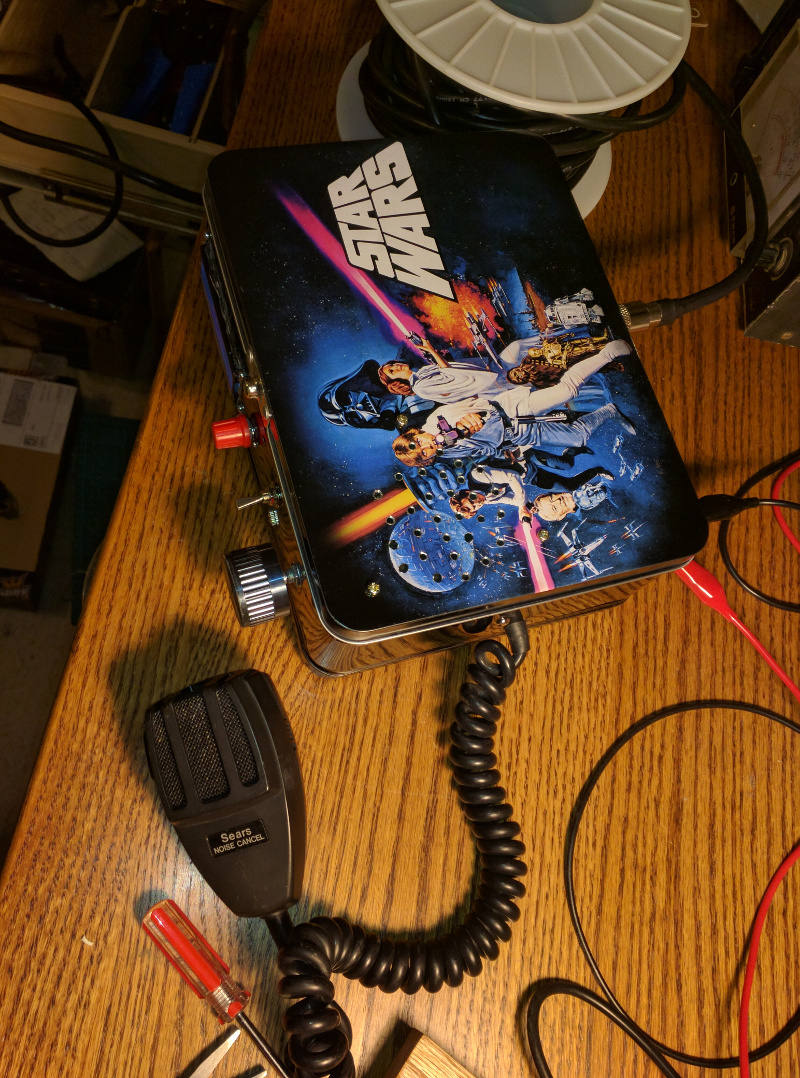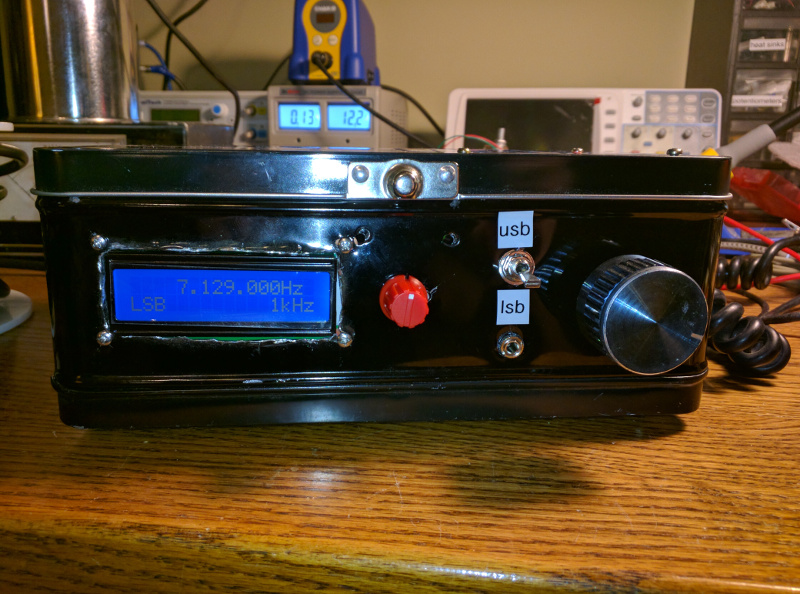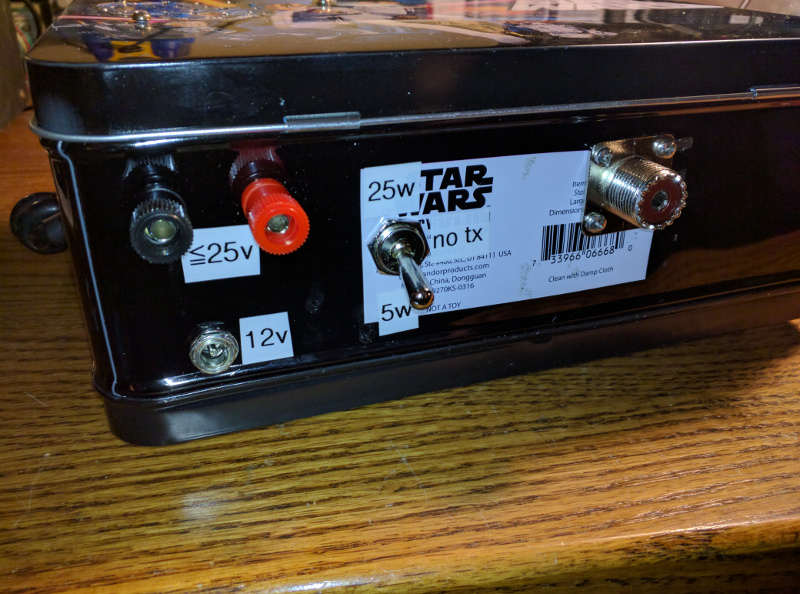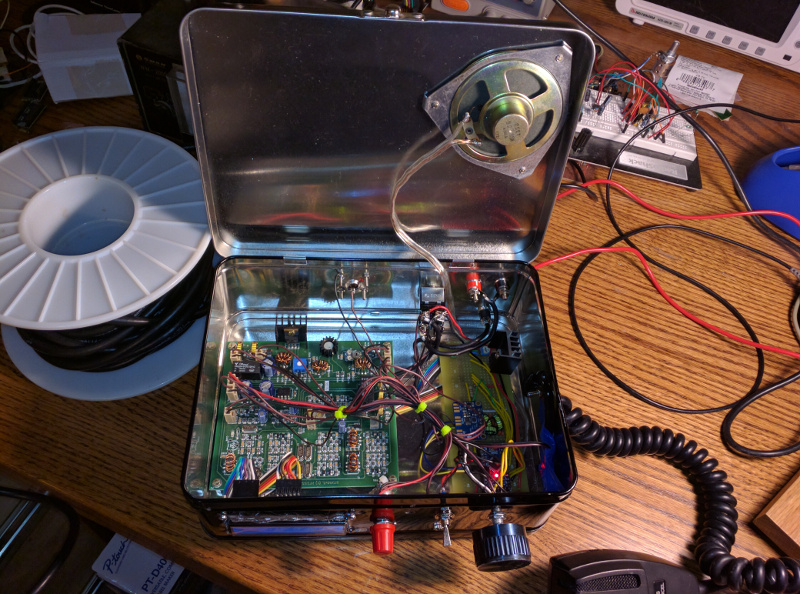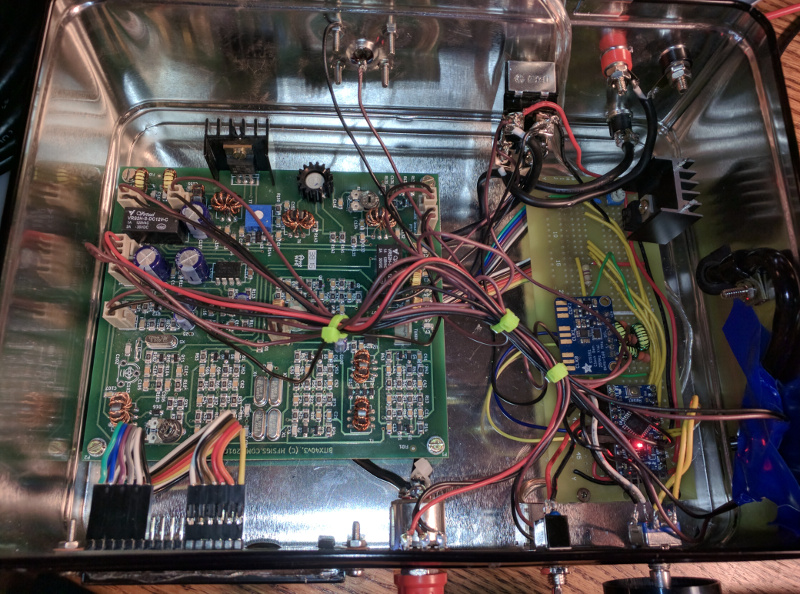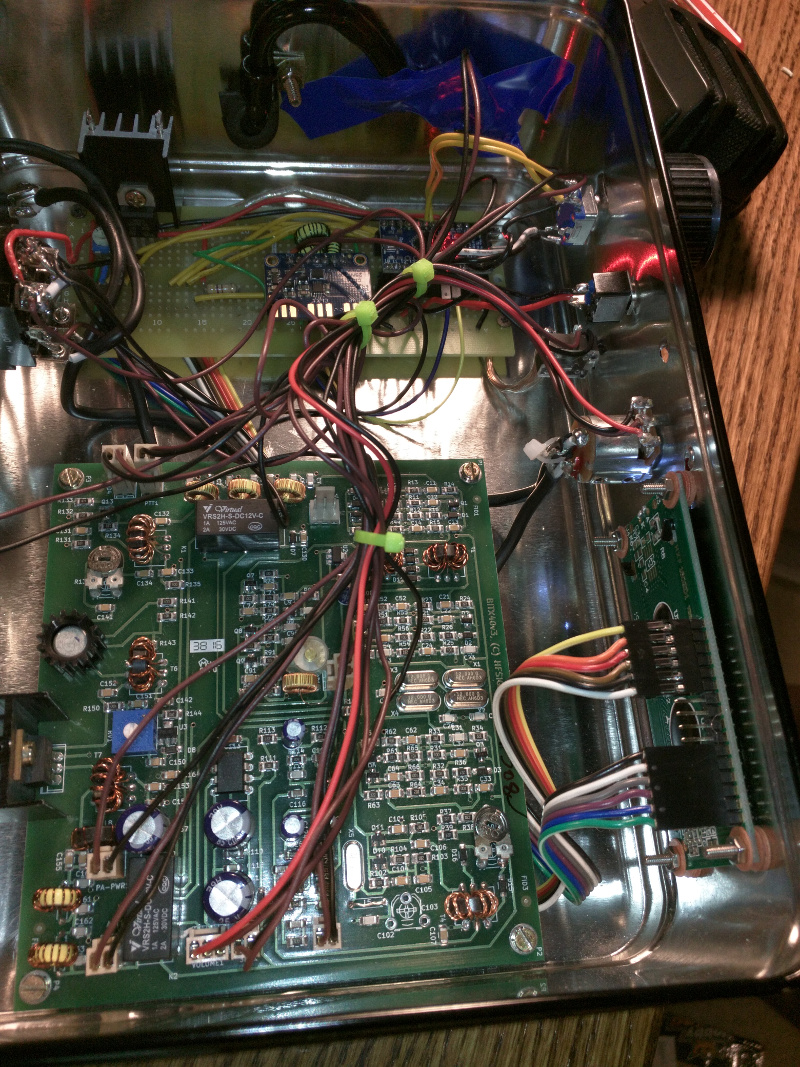The bitx module now has its own enclosure: A star wars lunch box!

I didn’t change much about my original setup. I ditched the s meter and added a manual usb/lsb switch to the front panel.

The red knob is the power/volume pot. There is a headphone jack under the switch and the rotary encoder on the right.
On the rear panel, I added the antenna jack, a dc jack that supplies the 12 volts to power the module, and an optional set of binding posts to supply up to 25 volts for the power amplifier. The switch changes the supply to the power amp on the bitx board. I wont be using the higher power until I can add a larger heat sink to the IRF510 and possibly a fan. I did a quick test on the output using both settings and the default 12 volts puts out about 5 watts and with 25 volts, I measured about 25 watts.

Inside the lunch box, you can see the bitx module on the left and the vfo board on the right. The vfo is an SI5351 board with an arduino pro mini. The board also contains a LPF for the SI5351 output and a 5v regulator.



The blue tape on the right side is holding the mic preamp board, from one of my previous bitx posts.
So far, everything is working as it should. I still need to add a fuse to the power input, a mic jack for using an external input, and I will probably tweak the arduino code a little more. For now, I will leave the current arduino code below. Most of the code below is based on code from Jason Mildrum, NT7S, Przemek Sadowski, SQ9NJE, and Tom Hall, AK2B.
1
2
3
4
5
6
7
8
9
10
11
12
13
14
15
16
17
18
19
20
21
22
23
24
25
26
27
28
29
30
31
32
33
34
35
36
37
38
39
40
41
42
43
44
45
46
47
48
49
50
51
52
53
54
55
56
57
58
59
60
61
62
63
64
65
66
67
68
69
70
71
72
73
74
75
76
77
78
79
80
81
82
83
84
85
86
87
88
89
90
91
92
93
94
95
96
97
98
99
100
101
102
103
104
105
106
107
108
109
110
111
112
113
114
115
116
117
118
119
120
121
122
123
124
125
126
127
128
129
130
131
132
133
134
135
136
137
138
139
140
141
142
143
144
145
146
147
148
149
150
151
152
153
154
155
156
157
158
159
160
161
162
163
164
165
166
167
168
169
170
171
172
173
174
175
176
177
178
179
180
181
182
183
184
185
186
187
188
189
190
191
192
193
194
195
196
197
198
199
200
201
202
203
204
205
206
207
208
209
210
211
212
213
214
215
216
217
218
219
220
221
222
223
224
225
226
227
228
229
230
231
232
233
234
235
236
237
238
239
240
241
242
243
244
245
246
247
248
249
250
251
252
253
254
255
256
257
258
259
260
261
|
#include <Rotary.h>
#include <si5351.h>
#include <Wire.h>
#include <LiquidCrystal.h>
#define F_MIN 100000000UL
#define F_MAX 5000000000UL
#define ENCODER_A 2
#define ENCODER_B 3
#define ENCODER_BTN 11
#define LCD_RS 5
#define LCD_E 6
#define LCD_D4 7
#define LCD_D5 8
#define LCD_D6 9
#define LCD_D7 10
#define SWITCH_PIN 12
int switchstate = 0;
LiquidCrystal lcd(LCD_RS, LCD_E, LCD_D4, LCD_D5, LCD_D6, LCD_D7); // LCD - pin assignement in
Si5351 si5351;
Rotary r = Rotary(ENCODER_A, ENCODER_B);
volatile int32_t LSB = -1199950000ULL;
volatile int32_t USB = -1200150000ULL;
volatile int32_t bfo = -1199950000ULL; //start in lsb
//These USB/LSB frequencies are added to or subtracted from the vfo frequency in the "Loop()"
volatile int32_t vfo = 710000000ULL / SI5351_FREQ_MULT; //start freq - change to suit
volatile uint32_t radix = 100; //start step size - change to suit
boolean changed_f = 0;
String tbfo = "";
/**************************************/
/* Interrupt service routine for */
/* encoder frequency change */
/**************************************/
ISR(PCINT2_vect) {
unsigned char result = r.process();
if (result == DIR_CW)
set_frequency(1);
else if (result == DIR_CCW)
set_frequency(-1);
}
/**************************************/
/* Change the frequency */
/* dir = 1 Increment */
/* dir = -1 Decrement */
/**************************************/
void set_frequency(short dir)
{
if (dir == 1)
vfo += radix;
if (dir == -1)
vfo -= radix;
changed_f = 1;
}
/**************************************/
/* Read the button with debouncing */
/**************************************/
boolean get_button()
{
if (!digitalRead(ENCODER_BTN))
{
delay(20);
if (!digitalRead(ENCODER_BTN))
{
while (!digitalRead(ENCODER_BTN));
return 1;
}
}
return 0;
}
/**************************************/
/* Displays the frequency */
/**************************************/
void display_frequency()
{
uint16_t f, g;
lcd.setCursor(3, 0);
f = vfo / 1000000; //variable is now vfo instead of 'frequency'
if (f < 10)
lcd.print(' ');
lcd.print(f);
lcd.print('.');
f = (vfo % 1000000) / 1000;
if (f < 100)
lcd.print('0');
if (f < 10)
lcd.print('0');
lcd.print(f);
lcd.print('.');
f = vfo % 1000;
if (f < 100)
lcd.print('0');
if (f < 10)
lcd.print('0');
lcd.print(f);
lcd.print("Hz");
lcd.setCursor(0, 1);
lcd.print(tbfo);
}
/**************************************/
/* Displays the frequency change step */
/**************************************/
void display_radix()
{
lcd.setCursor(9, 1);
switch (radix)
{
case 1:
lcd.print(" 1");
break;
case 10:
lcd.print(" 10");
break;
case 100:
lcd.print(" 100");
break;
case 1000:
lcd.print(" 1k");
break;
case 10000:
lcd.print(" 10k");
break;
case 100000:
//lcd.setCursor(10, 1);
lcd.print(" 100k");
break;
}
lcd.print("Hz");
}
void setup()
{
pinMode(SWITCH_PIN, INPUT_PULLUP);
Serial.begin(19200);
lcd.begin(16, 2);
lcd.clear();
Wire.begin();
si5351.set_correction(140); //**mine. There is a calibration sketch in File/Examples/si5351Arduino-Jason
//where you can determine the correction by using the serial monitor.
//initialize the Si5351
si5351.init(SI5351_CRYSTAL_LOAD_8PF, 0); //If you're using a 27Mhz crystal, put in 27000000 instead of 0
// 0 is the default crystal frequency of 25Mhz.
si5351.set_pll(SI5351_PLL_FIXED, SI5351_PLLA);
// Set CLK0 to output the starting "vfo" frequency as set above by vfo = ?
//Serial.println((long)((vfo * SI5351_FREQ_MULT) + bfo) * -1);
si5351.set_freq(((vfo * SI5351_FREQ_MULT) + bfo) * -1, SI5351_PLL_FIXED, SI5351_CLK0);
volatile uint32_t vfoT = abs((vfo * SI5351_FREQ_MULT) + bfo);
tbfo = "USB";
// Set CLK2 to output bfo frequency
si5351.set_freq( bfo, 0, SI5351_CLK2);
//si5351.drive_strength(SI5351_CLK0,SI5351_DRIVE_2MA); //you can set this to 2MA, 4MA, 6MA or 8MA
//si5351.drive_strength(SI5351_CLK1,SI5351_DRIVE_2MA); //be careful though - measure into 50ohms
//si5351.drive_strength(SI5351_CLK2,SI5351_DRIVE_2MA); //
Splash();
pinMode(ENCODER_BTN, INPUT_PULLUP);
PCICR |= (1 << PCIE2); // Enable pin change interrupt for the encoder
PCMSK2 |= (1 << PCINT18) | (1 << PCINT19);
sei();
display_frequency(); // Update the display
display_radix();
}
void loop()
{
// Update the display if the frequency has been changed
if (changed_f)
{
display_frequency();
//Serial.println((long)((vfo * SI5351_FREQ_MULT) + bfo) * -1);
si5351.set_freq(((vfo * SI5351_FREQ_MULT) + bfo) * -1, SI5351_PLL_FIXED, SI5351_CLK0);
//you can also subtract the bfo to suit your needs
//si5351.set_freq((vfo * SI5351_FREQ_MULT) - bfo , SI5351_PLL_FIXED, SI5351_CLK0);
switchstate = digitalRead(SWITCH_PIN);
if (switchstate == HIGH) {
//USB
bfo = USB;
tbfo = "USB";
si5351.set_freq( bfo, 0, SI5351_CLK2);
Serial.println("We've switched from LSB to USB");
} else {
// LSB
bfo = LSB;
tbfo = "LSB";
si5351.set_freq( bfo, 0, SI5351_CLK2);
Serial.println("We've switched from USB to LSB");
}
changed_f = 0;
}
// Button press changes the frequency change step for 1 Hz steps
if (get_button())
{
switch (radix)
{
case 1:
radix = 10;
break;
case 10:
radix = 100;
break;
case 100:
radix = 1000;
break;
case 1000:
radix = 10000;
break;
case 10000:
radix = 100000;
break;
case 100000:
radix = 1;
break;
}
display_radix();
}
lcd.setCursor(0, 1);
lcd.print(tbfo);
}
void Splash()
{
lcd.setCursor(0, 0);
lcd.print("BITX 40M XCVR");
//lcd.setCursor(3, 1);
//lcd.print("40M XCVR");
delay(4000);
lcd.clear();
}
```
|
